9 Skincare Mistakes Aging You Prematurely
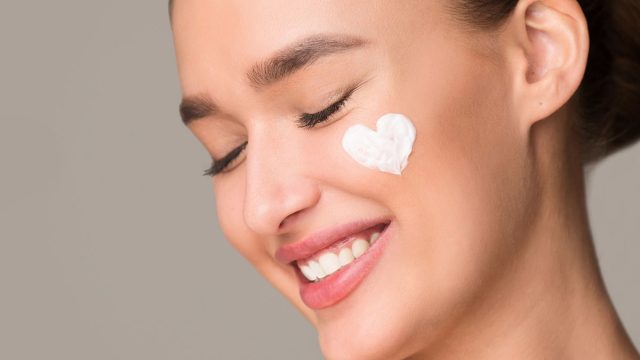
While there is no way to prevent your skin from aging, there are ways to slow it down – and, on the flip side, speed it up. "There are quite a few skincare mistakes I often run into among clients in my treatment room," Varuni Palacios, esthetician and founder of Studio Varuni in Los Angeles, tells Body Network. "Below, a few of the most common," she tells us.
Skipping SPF
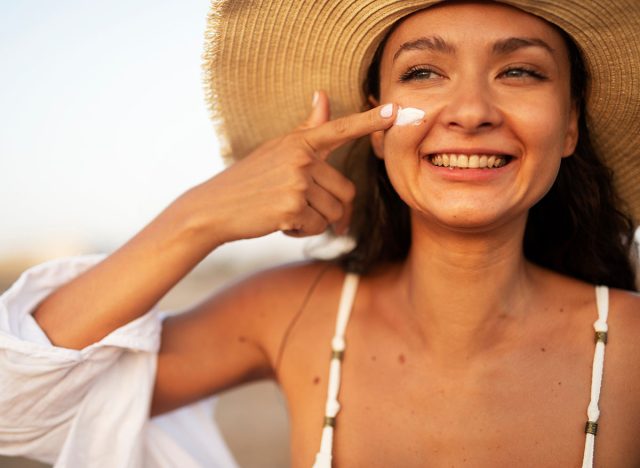
The first mistake is skipping SPF. "Sun damage via constant and prolonged exposure to the sun's harmful rays is the #1 cause of aging in the skin and in the body. On the skin, sun damage can look like hyperpigmentation, melasma, skin complexion irregularities, and premature fine lines and wrinkles. The #1 most effective way to prevent/avoid / combat sun damage is by using SPF. It's important to use it every single day, rain or shine, and in winter or summer. And always apply to the neck, decollete, and back of the hands," she says.
RELATED: I'm a Nutritionist and Here Are 19 Protein Truths You Need to Hear
Not Properly Removing Makeup
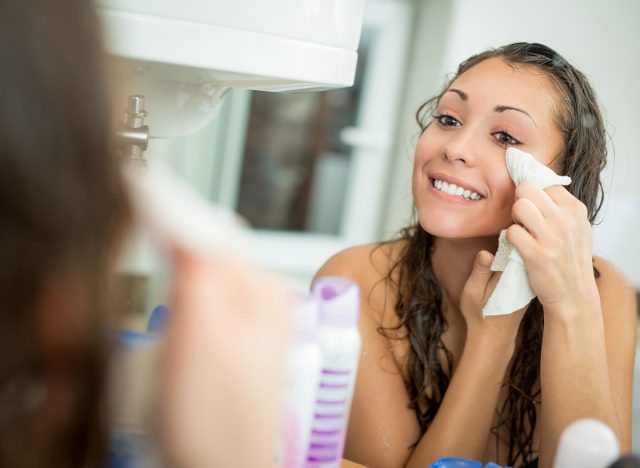
Next up, not properly removing makeup. "Proper makeup removal is crucial for maintaining healthy skin, yet it is often overlooked or inadequately performed," says Palacios. "At the end of a long day, we want to remove dirt, pollution, sunscreen, makeup, and debris from our skin to prevent clogged pores and maintain healthy, balanced skin. The most effective way to do this is via double cleansing. First, start with a micellar, cream, or oil cleanser, and then follow up with a thorough gel or foaming cleanser for best results."
Skipping Moisturizer
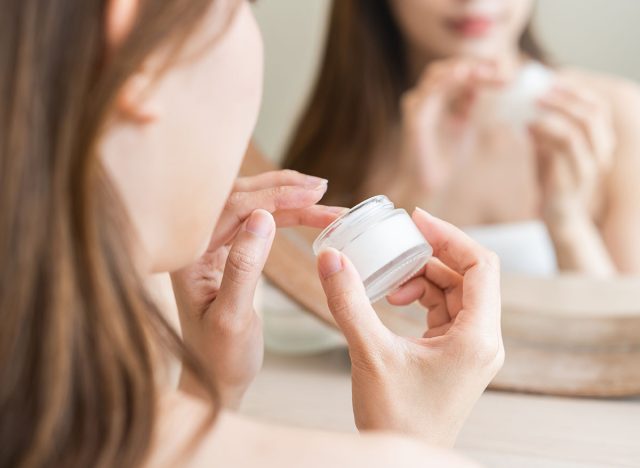
Are you skipping moisturizer because you think your skin is oily? Don't, says Palacios. "I often hear my clients say that they avoid using moisturizer because they think it makes their oily skin feel oilier. When we skip moisturizer, our skin goes into panic mode and overproduces oil to compensate for what it's missing. It feels counterintuitive, but hydration and moisture are so important for our skin, which is a hydro-lipid biome. It craves moisture and hydration. Without it, premature aging caused by dehydration will occur and look like dull, lackluster, dry, sagging, and wrinkled skin," she explains.
Not Getting Enough Sleep

Your skin may be suffering at the expense of your sleep. Not prioritizing sleep hygiene is a mistake, according to Palacios. "Our body and brains reset with sleep. It's the best, most important thing we can do to function well and feel good. Our body secretes human growth hormones during sleep, which help repair and regenerate skin cells, maintain collagen production, and reduce the effects of acute and chronic stress. Without restful and intentional sleep, we experience sleep deprivation, which is linked to increased cortisol, a prominent trigger of inflammation, breakouts, and premature aging."
RELATED: 25 Surprising Benefits of Walking Backwards: Why Experts Say It's Better Than 1,000 Steps Forward
Ignoring the Neck, Decollete, and Hands
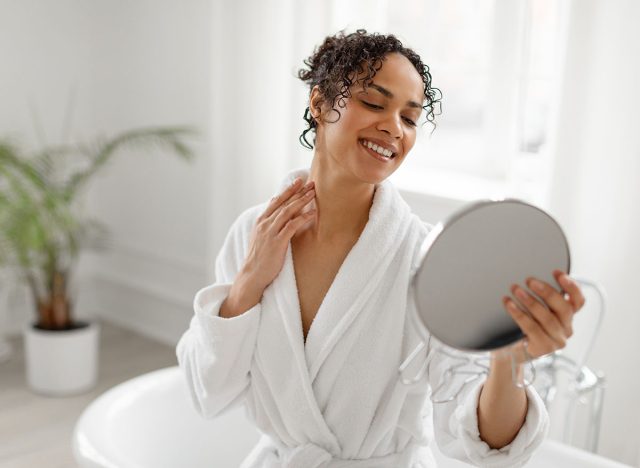
Are you ignoring the neck, decollete, and hands when it comes to skincare? "Aging shows in the face first, but also on the neck, decollete and hands——places where our skin is thinnest and most exposed to the sun (driving!) I always direct my clients to treat these areas just like they would the skin on their face and apply cleansing, hydrating, and rejuvenating products and treatments to these areas," Palacios says.
Getting Too Much Sun

Ignoring sun exposure is another faux pas. "Wearing SPF is important, but even better if we can avoid the sun altogether. It isn't cool to suntan anymore because we know that the effects are so harmful. If you're going to be out in the sun (hiking, at the beach, driving, etc.), take other preventative measures to avoid the sun (wear a hat, stay in the shade), especially at times of the day when the sun is harshest," says Palacios.
Using Poor Quality Skincare
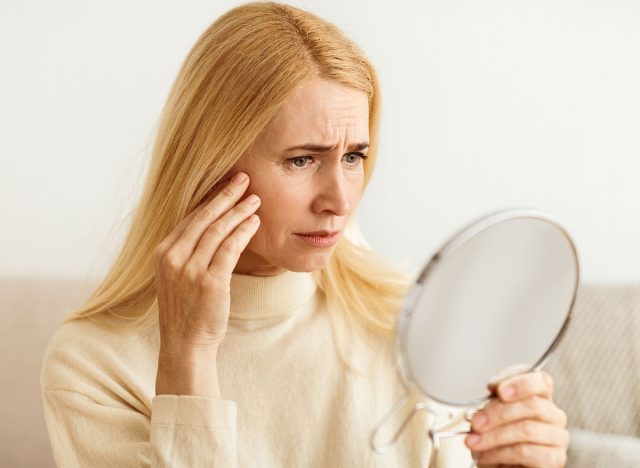
Using poor-quality skincare can age your skin faster. "I have a few rules when it comes to good skincare: 1: You get what you pay for. 2: Consistency is key. And 3: Clinical studies are everything," says Palacios. "Clinical studies are one of the most critical ways to understand effectiveness; however, they're expensive for brands to conduct, and they are often a factor in product price points. Additionally, modern formulations come with better delivery methods for ideal penetration into the deeper layers of the epidermis and dermis——another price point factor. It's up to us to be conscious consumers and do our research so that we see beyond fancy packaging and cheap price points. When it comes to skincare, quality is key and an important investment."
Skipping Exfoliation
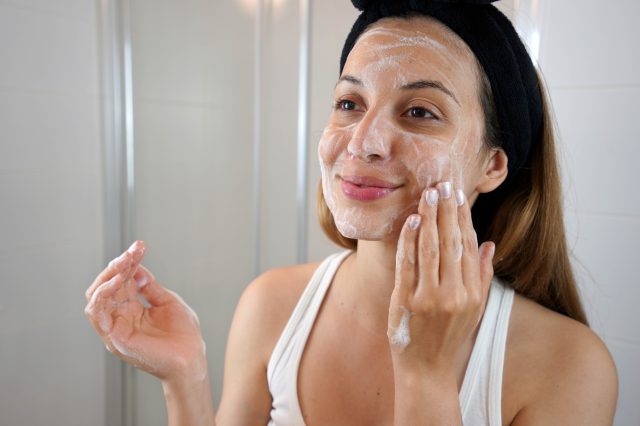
Skipping exfoliation is another mistake you don't want to make. "Exfoliation, also known as desquamation, is the process of removing dead skin cells from the surface of the skin. It is a natural part of the epithelial process and happens naturally in cycles synced with our metabolism. As we age, the desquamation process slows (alongside our metabolism), and so exfoliation using exfoliators becomes important for maintaining healthy, ageless skin," Palacios says.
There are three types of exfoliators: physical (through the use of scrubs, brushes and tools), enzymatic (through the use of enzymes which work on the superficial levels of the epidermis to break down keratin——enzymes literally digest the dead skin cells on the surface of your skin), and chemical (use alpha hydroxy acids, beta hydroxy acids and other chemical compounds to work at every layer of the skin.)
"To maintain healthy-looking, glowing, even-toned skin and tackle problematic concerns like acne and pigmentation, I recommend a gentle exfoliation routine for almost every single one of my clients, through a combination of physical, enzymatic, and chemical exfoliation both at home and in the treatment room. However, it's important not to overdo it, and we must replenish the skin whenever we exfoliate to prevent irritation and damage to the skin barrier. Hydration is a key partner in exfoliation," she adds.
RELATED: Get a Zero Belly Without Counting Calories or Starving Yourself
Eating Too Much Added Sugar
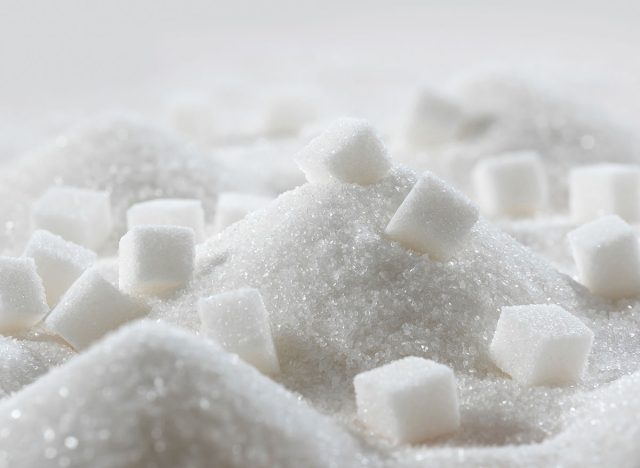
Lastly, eating too much-added sugar can prematurely age your skin. "If you invest in anti-aging treatments and skin care and eat a lot of processed, added sugar, you're missing the point," says Palacios.
"When your blood sugar spikes, your body releases inflammatory chemicals called cytokines, which can lead to skin issues like acne, redness, puffiness, rosacea, and psoriasis. When your blood sugar spikes, your body can't handle the excess, and a chemical reaction called glycation occurs. Glycation weakens the collagen and elastin in your skin and leads to wrinkles, sagging, and a dull appearance." And if you enjoyed this article, don't miss 40 Health Symptoms That Can Be More Serious Than You Think.




